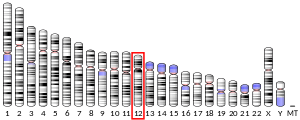Probable G-protein coupled receptor 162 is a protein that in humans is encoded by the GPR162 gene.[5][6]
This gene was identified upon genomic analysis of a gene-dense region at human chromosome 12p13. It appears to be mainly expressed in the brain; however, its function is not known. Alternatively spliced transcript variants encoding different isoforms have been identified.[6]
Further reading
- Ansari-Lari MA, Muzny DM, Lu J, et al. (1996). "A gene-rich cluster between the CD4 and triosephosphate isomerase genes at human chromosome 12p13". Genome Res. 6 (4): 314–26. doi:10.1101/gr.6.4.314. PMID 8723724.
- Ansari-Lari MA, Shen Y, Muzny DM, et al. (1997). "Large-scale sequencing in human chromosome 12p13: experimental and computational gene structure determination". Genome Res. 7 (3): 268–80. doi:10.1101/gr.7.3.268. PMID 9074930.
- Strausberg RL, Feingold EA, Grouse LH, et al. (2003). "Generation and initial analysis of more than 15,000 full-length human and mouse cDNA sequences". Proc. Natl. Acad. Sci. U.S.A. 99 (26): 16899–903. doi:10.1073/pnas.242603899. PMC 139241. PMID 12477932.
- Gerhard DS, Wagner L, Feingold EA, et al. (2004). "The status, quality, and expansion of the NIH full-length cDNA project: the Mammalian Gene Collection (MGC)". Genome Res. 14 (10B): 2121–7. doi:10.1101/gr.2596504. PMC 528928. PMID 15489334.



